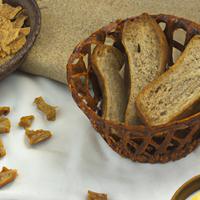
1 serving (30 grams) contains 120 calories, 4.0 grams of protein, 2.0 grams of fat, and 22.0 grams of carbohydrates.

Log this food in SnapCalorie

Nutrition Information
Calories |
960 | ||
|---|---|---|---|
% Daily Value* |
|||
| Total Fat | 16.0 g | 20% | |
| Saturated Fat | 4.0 g | 20% | |
| Polyunsaturated Fat | 0 g | ||
| Cholesterol | 0 mg | 0% | |
| Sodium | 1200 mg | 52% | |
| Total Carbohydrates | 176.0 g | 64% | |
| Dietary Fiber | 24 g | 85% | |
| Sugars | 16.0 g | ||
| protein | 32.0 g | 64% | |
| Vitamin D | 0 mcg | 0% | |
| Calcium | 160.0 mg | 12% | |
| Iron | 8.0 mg | 44% | |
| Potassium | 400.0 mg | 8% | |
* Percent Daily Values are based on a 2,000 calorie diet. Your daily values may be higher or lower depending on your calorie needs.
Food Attributes
Source of Calories
About Bran rusk
Bran rusk is a twice-baked bread product made with wheat bran, flour, sugar, and other ingredients like yeast or eggs. Originating from European cuisine, it is a popular choice for breakfasts and snacks, appreciated for its crispy texture and long shelf life. Bran, the outer layer of the wheat kernel, boosts the nutritional profile of the rusk by being rich in dietary fiber, which aids digestion and promotes gut health. Bran rusks typically have a moderate calorie count and are low in fat, but they may contain added sugars, so portion control is recommended. Often enjoyed plain, with tea, or topped with spreads, they are a convenient option for those seeking a fiber-rich addition to their diet. However, individuals watching sugar intake should choose varieties specifically made without added sweeteners or opt for whole-grain alternatives.



